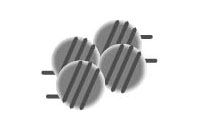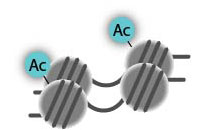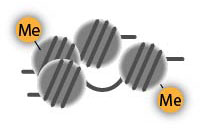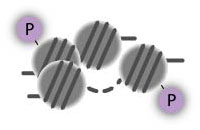Chemical modifications of either DNA itself or DNA-binding proteins alter chromatin modeling to “hide” or “reveal” DNA segments. Tuning of these modifications allows cells to control accessibility of genes by transcriptional machinery, thereby regulating gene expression. Heritable epigenetic changes are modifications that can be passed on through cell division, and when dysregulated, can lead to disease. For example, certain cancers can be initiated by aberrant chromatin modifications that become heritable within a population of cells. Chromatin remodeling and epigenetics are therefore areas of intense research in cancer biology, developmental biology, and neuroscience. Our reagents can help accelerate your discovery of novel epigenetic processes and therapeutic targets.
 |
Histones – Histone proteins bind DNA to form chromatin, and efficiently package the genome into higher order structures like nucleosomes and chromosomes. Covalent modifications of histones are used to carefully control DNA compaction, and which genes become available for expression. Browse Anti-Histone Antibodies. |
 |
Acetylation – Acetylation of histones relaxes chromatin structure and reveals DNA for expression. This is regulated in part by histone deacetylases (HDACs), which remove acetyl groups from histones to silence genes, and have been shown to be involved in diseases like cancer. Browse Anti-Acetylation and Anti-HDAC Antibodies. |
 |
Methylation – Histone methylation can have either repressive or activating effects on gene expression, depending on the site of methylation. Our antibodies are highly specific for methylation sites to ensure accuracy of your results. Browse Anti-Methylation Antibodies. |
 |
Phosphorylation – In addition to modulating the packaging and relaxing of chromatin, phosphorylation of histones can also regulate other cellular processes such as DNA damage repair and apoptosis. Browse Anti-Phosphorylation Antibodies. |
 |
Chromatin Immunoprecipitation (ChIP) – ChIP allows for the characterization of DNA sequences that bind to histones or other proteins by capturing protein:DNA complexes with antibodies. Our Go-ChIP-Grade™ Protein G Enzymatic Kit uses a proprietary chromatin-capturing porous disc to eliminate the need for beads, and laborious washing and elution steps. Browse ChIP products. |
 Login / Register
Login / Register 







Follow Us